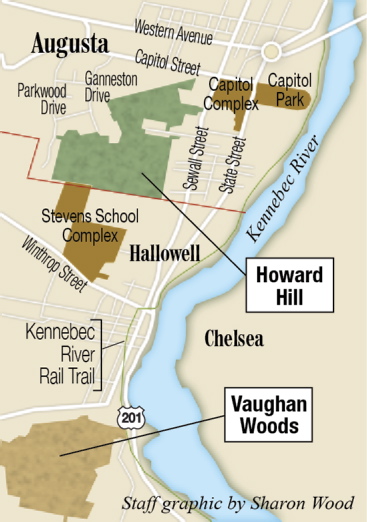AUGUSTA — A project that would preserve the wooded backdrop to the Maine State House has a problem in the Maine State House.
Howard Hill is caught in a political battle: Gov. Paul LePage’s administration says the governor doesn’t want to sell $11.4 million in voter-approved bonds as he tries to gain support for a plan that would increase the amount of timber harvested on state land to pay for energy efficiency programs.
Critics have said the Republican is the only governor who has politicized the Land for Maine’s Future program like this. Last year, its board approved $9.1 million in funding for 30 projects across the state that encompass nearly 50,000 acres and protect deer wintering areas, forestland, campsites, water supplies, farms, sportsman access and more.
Among them was the Kennebec Land Trust’s proposed project on Howard Hill, which would transfer to the city of Augusta 164 acres of privately owned property running from Capitol Street in Augusta to the Hallowell city line. There’s a loose trail system there already, with views of the State House, the Kennebec River and Augusta’s east side.
Last year, the project was allocated $338,000 in LMF funding, getting a letter from the program’s board calling it “one among 30 outstanding projects selected.”
Theresa Kerchner, the trust’s executive director, said $1.2 million must be raised for the project. It has raised about the same amount as last year’s state funding — $338,000 — through private sources already, but she said delaying the award could harm project planning. Kerchner said LePage is “failing to live up to the promises and commitments he made.”
“Our business plan for the project is based on that award, so we’re very disappointed that we’re in the position we’re in, in terms of the LMF program,” she said. “So we have to wait it out.”
Bigger projects are in similar positions. In Somerset County, two massive conservation projects each got $1.5 million in funding last year.
The Cold Stream Forest Project includes more than 8,000 acres of deer wintering habitat north of The Forks, also preserving streams and more of the wild brook trout population than all of the rest of northern New England combined. Northeast of Moosehead Lake, the Seboomook Expansion would shelter 10,000 acres of land, preserving a snowmobile trail from Rockwood to Jackman.
David Trahan, executive director of the Sportsman’s Alliance of Maine, which has worked on the Cold Stream project, said withholding bonds could harm Maine’s rural economy. Studies conducted for the Maine Department of Inland Fisheries and Wildlife said hunting and fishing in Maine had a $550 million impact in 2013, supporting 6,700 jobs paying nearly $220 million in income.
“I hope that the governor’s office will reconsider what they’re doing,” said Trahan, a former Republican state senator, “and the reason is, this governor, throughout his administration, has talked about jobs and the economy.”
But in a statement, LePage spokeswoman Adrienne Bennett said the governor is not interested in “purchasing additional land” under the program, though some conservation projects funded by LMF keep land privately held.
She said he supports some of the projects, and he and his staff are reviewing them “to better understand the financial needs of the program.” However, she said “several of the organizations that are now demanding LMF funding opposed providing Mainers with money to keep their homes warm in the cold winter months.”
In 2014, a LePage proposal to use money generated by increased logging on public land to pay for residential efficiency programs was defeated in the Legislature amid opposition from Democrats and environmental groups.
They included the Maine Audubon Society and the Natural Resources Council of Maine, which have since criticized the governor for not releasing bonds, which he has five years to do. Bennett said LePage will re-introduce legislation to use $5 million from the timber harvest to pay for energy upgrades, and she said “supporting this proposal to help keep Mainers warm should be a no-brainer for these organizations.”
Land for Maine’s Future was established in 1987 when voters approved $35 million to buy land of statewide importance. Since then, projects in all 16 counties have been funded through state borrowing or direct appropriations from the Legislature, according to the program’s website.
Sen. Roger Katz, R-Augusta, said “it’s really unfortunate” that the Howard Hill project is tied up because of an unrelated issue, and that he has asked LePage to at least release the project’s share of funds.
“I’m hopeful that he’s considering it,” Katz said.
Michael Shepherd — 370-7652
Twitter: @mikeshepherdme
Send questions/comments to the editors.




Comments are no longer available on this story